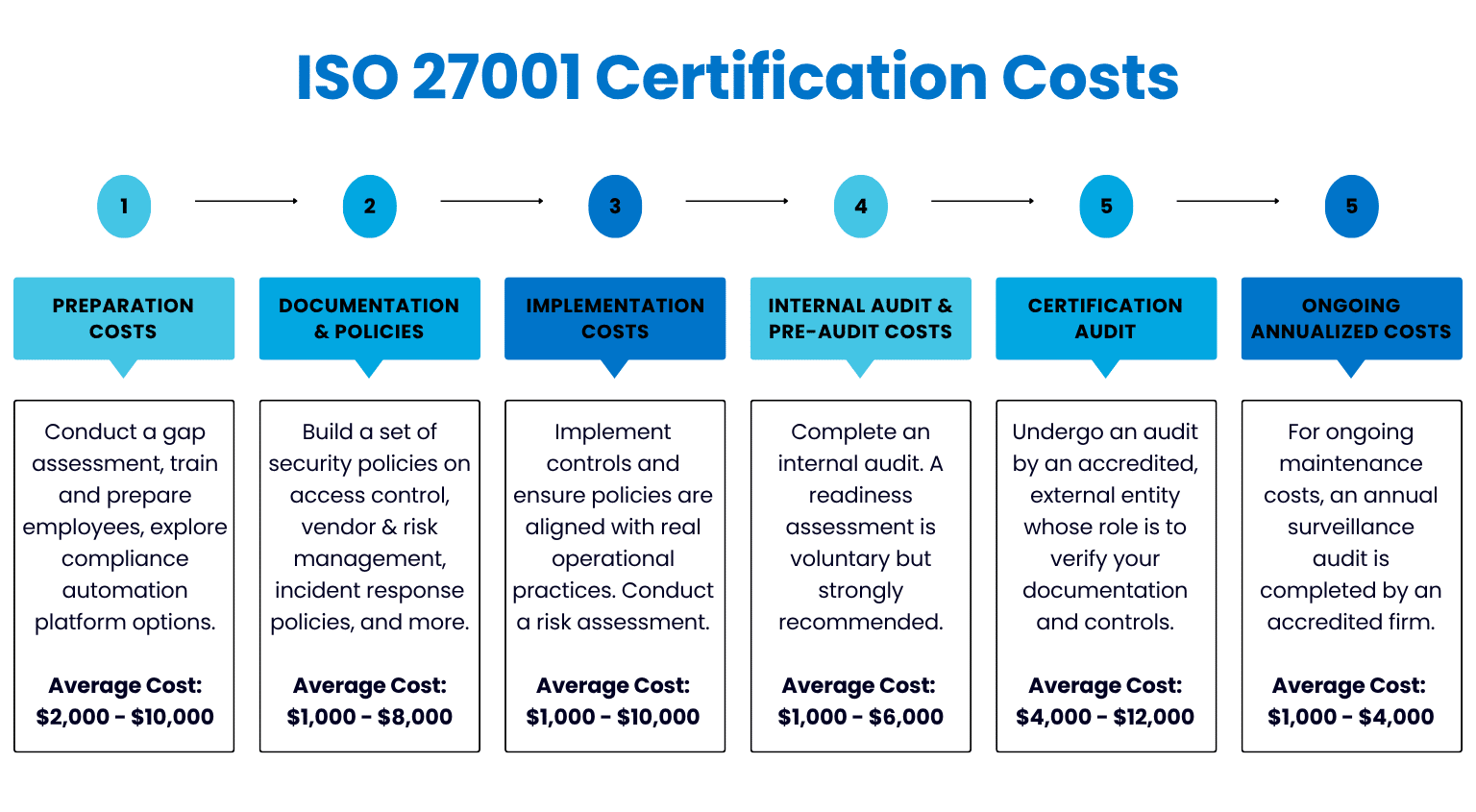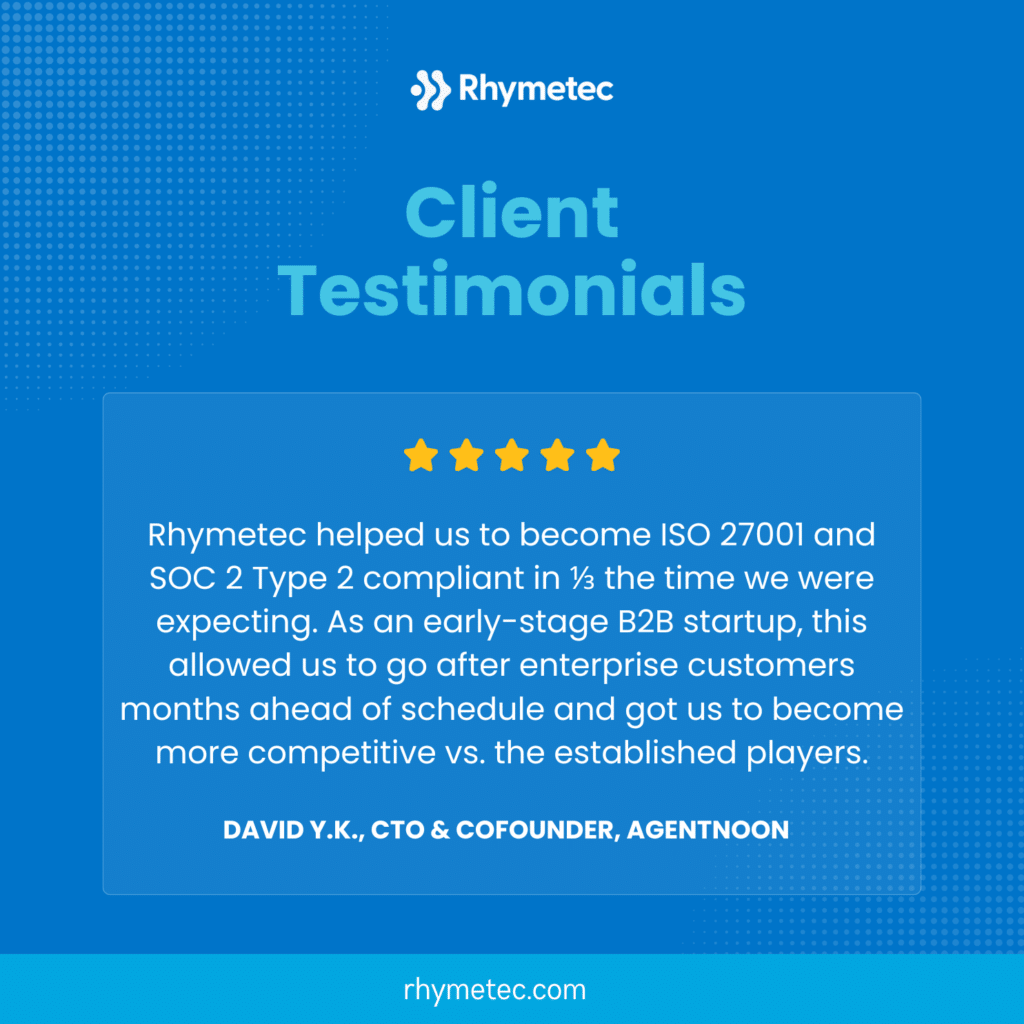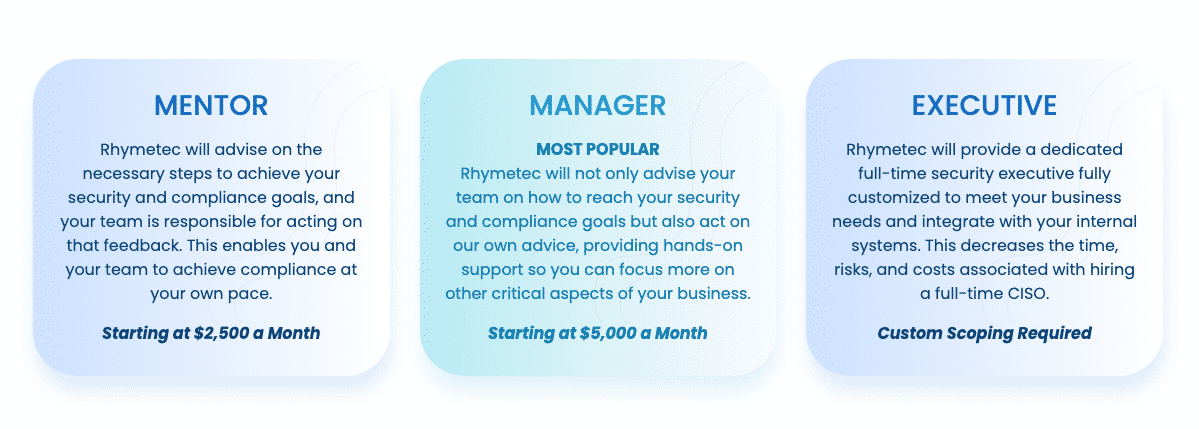In 2025, more companies than ever before are budgeting for ISO 27001 certification costs. In a recent ISO survey, the global number of ISO 27001 certificates reached over 70,000 certificates and were reported in 150 countries and across a range of economic sectors.
Many of these certifications are driven by customer demand and procurement requirements, in particular in fields such as B2B SaaS.
Understandably, cost is often one of the most important questions companies exploring their compliance options have. ISO 27001 is a bit more involved than other frameworks in this space, such as SOC 2, as it requires a broader set of security controls and third-party requirements.
External audit costs, internal resource time, implementing technology changes at your organization, and ongoing maintenance all factor into ISO 27001 certification costs. Without a clear breakdown, it can be easy to underestimate both the initial investment and the ongoing effort.
This blog outlines what to expect for ISO 27001 certification costs, based on current market data, our team’s firsthand experience working with SaaS startups, and input from certified auditors we work closely with.
Preparation Costs
Preparation costs for ISO 27001 represent a substantial part of the overall investment. Before engaging a registrar (an accredited certification body), your organization must complete a range of activities that require time, resources, investing in new technologies, and, in many cases, external support.
Typically, the first step of an ISO 27001 engagement is a gap assessment. A gap assessment shows where you are versus where you need to be by identifying missing controls and policy gaps in comparison to the ISO 27001 standard. Companies may complete this assessment internally or work with a third-party consultant for greater objectivity and expertise (if you don’t have in-house personnel with compliance experience).
Following the gap assessment, staff training and security awareness are typically the next steps.
Every employee needs to understand their role in protecting both company and customer data. Your organization will likely need to develop new onboarding materials, invest in employee training sessions, and plan targeted training sessions for engineers and leadership.
The adoption of new software for compliance is often included in the preparation phase. Startups in rapid phases of growth typically select to use tools like Drata or Vanta to automate the pieces of compliance that can be automated, and keep track of their progress in one central place.
These tools support policy management, control tracking, evidence collection, audit preparation, and more. These platforms can vastly simplify the compliance process, but they do entail an investment. Check out our blog post on compliance automation platforms for more information on how these tools work and how they accelerate compliance.
Each one of these preparation activities helps to create a foundation for a successful certification process. Companies that invest early on in assessments, training, and new technologies tend to move through the audit with greater efficiency and fewer surprises. While the cost ranges vary, the effort spent up front directly impacts how much time and work will be needed later on.
Estimated Total Cost of Preparation: $2,000 - $10,000
ISO 27001 Certification Cost: Documentation and Policy Development
ISO 27001 requires formal documentation of the Information Security Management System (ISMS), including your policies and procedures. Documents are reviewed during the audit and must align with how your organization operates in practice.
For this step, most companies begin by building out a core set of policies around access control, vendor management, risk management, acceptable use policies, incident response policies, and asset management. Policies must reflect actual practices and responsibilities that are implemented.
While templates can be used to accelerate this step, customization specific to your organization is important. This is a good example of where using a compliance automation tool (such as Vanta or Drata) in combination with working with an expert security and compliance professional (such as our vCISOs at Rhymetec) can be extremely helpful:
The compliance automation tool provides an excellent baseline, while a dedicated team can customize documentation and policy development to your organization in a way that will pass scrutiny during your audit.
Some companies choose to adopt a full ISMS documentation toolkit or policy automation platform. Although optional, these tools simplify everything from version control to auditor access and stakeholder review, but they do come with additional software costs.
Your documentation will be one of the most scrutinized aspects of your ISO 27001 audit. It’s critical to adequately plan out enough time and resources to draft, review, and align policies with actual practices. Building out your policies with day-to-day operations in mind can help streamline the audit process while supporting long-term security and compliance.
Estimated Cost of Documentation and Policy Development: $1,000 - $8,000
Implementation Costs: Building The Framework
Once documentation is drafted, the next step is to begin actually implementing the controls required by ISO 27001.
The most critical piece of this phase is making sure your policies are aligned with real operational practices. Additionally, at this stage, you will assign responsibilities and validate that controls work as they are meant to. Costs can also add up during the implementation phase from technology upgrades you may need.
Conducting a risk assessment and documenting a plan to mitigate any identified risks is also a key part of this stage. Many companies choose to circumvent the need to acquire new technologies and dedicate internal resources by engaging a vCISO (Virtual CISO). At Rhymetec, our vCISOs take the implementation work off your plate and accomplish these items for you.
Estimated Implementation Costs: $1,000 - $10,000
Internal Audit and Pre-Audit Expenses
Before undergoing your certification audit, you’ll need to complete an internal audit.
In many cases, organizations will outsource this step to a firm specializing in pre-audit assessments (or, if you are already working with a vCISO, they will do this work for you!). Organizations with internal teams can manage this on their own, but many choose to work with outside consultants to speed things up and ensure objectivity. It’s important to note that it’s encouraged to find internal auditors who are PECB-accredited.
The pre-audit, or readiness assessment, is a voluntary but highly recommended assessment typically carried out by a consultant (such as a vCISO) or the certification entity. This serves to mimic your official audit, identifying areas of weakness and reducing the risk of non-conformity during your real audit. Costs during this stage also reflect the need to revise any discovered gaps, finalize your evidence collection, and coordinate between teams.
Estimated Internal Audit & Pre-Audit Costs: $1,000 - $6,000
Certification Audit Costs
After you’ve completed your ISO 27001 readiness work, the ISO 27001 certification audit is conducted by an accredited, external entity. The process is divided into two phases:
Phase 1 - Verifies your documentation.
Phase 2 - Verifies that controls are working as intended.
Costs depend primarily on organizational size, which region you are in, how complex your infrastructure is, and the level of risk associated with your operations. The total cost of the audit covers both of these phases. For startups or for SMBs with less than 100 employees, the audit typically takes anywhere from a few days to two weeks.
If areas of non-conformity are discovered during the audit, it may be necessary to undergo a follow-up audit after making changes. This can cost extra as well. Some auditing firms also tack on administrative costs, in addition to the baseline cost of the audit.
Estimated Cost For Accredited ISO 27001 Audit: $4,000 - $12,000
Ongoing Costs: Maintaining Your Certification
Once certification has been obtained, your organization must maintain the ISMS and undergo annual surveillance audits. This requirement generates a recurring set of compliance activities to be completed every year:
The annual surveillance audit is completed by an accredited firm. While less demanding compared to the original audit, it’s still an obligatory step. Your internal team or vCISO will manage updating documentation, risk remediation where needed, technical control updates, and more.
Additionally, every three years your organization will need to undergo a recertification audit, with costs similar to the initial audit. This is built into the overall ISO 27001 certification costs for ongoing maintenance.
Estimated Ongoing Costs (Annualized): $1,000 - $4,000
Additional Factors That May Influence Your ISO 27001 Certification Cost
While most organizations follow a similar certification process, a number of variables can influence total cost. The following factors will affect the duration of your audit, internal preparation effort, and the level of external support needed:
Company Size and Structure
Larger teams, companies with multiple office locations, or hybrid work environments tend to increase both the number of controls and the audit scope. Costs due to these factors add up in terms of time spent on audit activities, documentation, and coordinating with internal teams.
Level of Technical Complexity
Companies with custom infrastructure, multi-cloud environments, or proprietary platforms often require additional effort in terms of documentation and control verification. Auditors also need to spend more time reviewing technical evidence in these cases.
Systems and Vendors That Are In-Scope
The number of systems and third-party services included in the ISMS directly affects the depth and length of your audit. Most companies include at least a dozen vendors in their initial ISO 27001 scope.
Internal Experience Level
Companies without prior compliance experience will require a greater level of external guidance. Meanwhile, teams that are already familiar with SOC 2 or similar frameworks tend to move faster and are able to reduce external costs.
The controls required for ISO 27001 overlap with several other popular frameworks in this space. If you already have SOC 2, for example, your organization can leverage some of those requirements to meet some of the ISO 27001 requirements.
Auditing Body Selection
Certification bodies charge different rates and employ slightly different methodologies. Regional pricing differences, travel costs, and preferred audit partners can influence the final quote.
Total ISO 27001 Certification Cost
For most startups and SMBs, the full cost of ISO 27001 certification falls between $10,000 - $50,000. This covers everything from preparation, implementation, internal and external readiness assessments, the official audit, and the first year of ongoing expenses.
Companies building from scratch and managing the process on their own will fall toward the higher range, while companies that opt to engage external support (such as a vCISO) will see lower overall bundled costs, even if they are starting from scratch.
This cost is front-loaded in year one, with most of the budget being allocated before and during the initial audit. After certification, annual maintenance costs are typically much lower.
In Conclusion: Planning For ISO 27001 Certification Cost
ISO 27001 certification is a multi-phase effort that touches nearly every part of a company’s operations. The audit itself is just one part of the full cost. Preparation work, implementation of the ISMS, internal (and external) testing, and ongoing maintenance all contribute to the total budget.
Companies that plan early on and understand their internal capacity are better positioned to keep costs under control. For early-stage teams, the main drivers of cost are scope, control maturity, and whether you’re handling the work internally or bringing in outside help.
Most startups and small to mid-sized companies spend between $10,000 - $50,000, depending on how much needs to be built from scratch. Large corporations may spend over $100,000, depending on their industry and the complexity of their operations. At Rhymetec, our vCISO pricing depends on which tier of support you select:
Properly budgeting for ISO 27001 certification costs enables organizations to get certified while building sustainable security practices that scale as the business grows. Whether you are in the early stages of building your compliance program or if you have already started the work and feel stuck, our experts can assist. Contact us today to get started.


